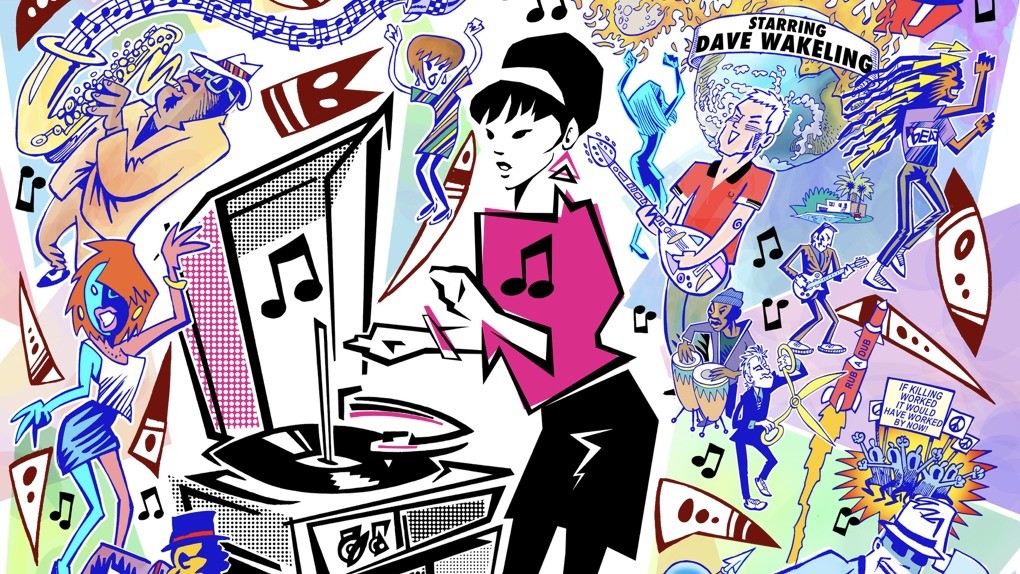Bringing back elements of the 1980s sound has scored convenient success in the present landscape of synth-driven music. Just ask Paramore, Dreamcar, and LCD Soundsystem. Perhaps that is why Dave Wakeling, founding singer and guitarist of The English Beat, decided to release Here We Go Love, the first album under the English Beat moniker in 36 years.
But instead of leaning on synths that have one foot in each decade, Wakeling and company have rolled out an album full of perky organ and ska-infused new-wave grooves that act as a time machine to the early ’80s, right where the band left off after opening for such acts as The Pretenders and David Bowie. From its first chords that encourage vigorous arm bobbing, Here We Go Love recalls a time of mullets, Members Only jackets, and Cold War posturing.
Original English Beat members Everett Morton and Andy Cox join Wakeling on Here We Go Love, the former contributing congas and the latter trading his guitar for garden shears. Founding saxophonist Saxa, sidelined by an injury, did not record on the release but wrote sax parts for the album before he passed away last year.
Within the album’s apparently nostalgic romp, however, timely themes spring into action. On the pop-rocker “The One and Only,” Wakeling skewers supporters of Trump (“You can feel the anger as times go by / with every little sideways look / but he’s not that strong / and he’s not that novel / you can read him like a book”).
Over the bouncy upstroke of “How Can You Stand There?,” Wakeling calls out those who do nothing “when all around you is a lie” and while “so many much worse off than you / how can you stand there and just watch them do it?” While Wakeling maintained in an interview with the Washington Times that he wrote the lyrics before the 2016 election, he has done little to hide his tying of the song’s deeper theme of ignoring violations of personal liberties to the current atmosphere of state-sponsored racism. “We can make America great again, but we can’t make it 1960 again,” he said in the album’s press release.
His topical lyrics turn to a timeless anti-war theme on “If Killing Worked,” whose haunting power draws from Wakeling pairing the tub-toy innocence of a cheerful melody with the fangs of a sarcastic refrain (“If killing worked, it would have worked by now”).
As the Costello-esque feel of “If Killing Worked,” fortified with a beefy snare seemingly borrowed from The Outfield, is similar to that of “The One and Only,” the band wisely separated the two tracks with the dancefloor-beckoning reggae number “Redemption Time.” Horn player Danny Levin crowns the latter with a sweetly rippling trumpet solo, a rarity for any era of rock and pop music.
“The Love You Give” showcases Wakeling’s philosophical reflections on love and mortality (“The love you give lasts forever / even when you’re gone”) in a tight, catchy, singer-songwriter package. “Never Die,” however, draws from the well of ’80s Velveeta ballads, one of that decade’s several unfortunate sonic equivalents of a bad haircut. Meanwhile, the snappy and satisfying “You’re Stuck,” which conjures thoughts of Men at Work going through a ska phase, should have served as an example of brevity when recording “You Really Oughtta Know,” whose tasty shuffle turns stale after running too long. Despite such uneven areas, the album survives intact.
While “Every Time You Told Me” ventures into “Mustang Sally”-inspired R&B territory, Here We Go Love hardly breaks any new musical ground. The English Beat’s retro-sounding release, albeit thankfully leaving out the drenching of ’80s reverb, lies in curious contrast with the 2016 album Bounce, released by the band’s other branch (known as The Beat), headed by Ranking Roger, The English Beat’s other founding vocalist. On Bounce, Ranking Roger experimented with weaving melodies in the vein of Coldplay and Train into The English Beat’s reggae-flavored pop, with mixed success.
At the same time, Here We Go Love is a welcome offering that, thanks to its organic instrumentation, manages to sound refreshing as it pushes back against overproduced and overcompressed music that often dominates this decade’s charts. The most memorable moments on the album stand equally as tall when measured up against the thrilling energy of “Mirror in the Bathroom” from the band’s 1980 debut.
I can’t help but imagine what would happen if both English Beat vocalists decide to get back together. The result could be a slamming cocktail of Wakeling’s knack for pop hooks and Ranking Roger’s ear for modern music. Such a reunion would not be that farfetched; both singers went on to co-found General Public in the mid-80s. But it’s been over twenty years since the last General Public album. Ranking Roger is in his 50s, Wakeling in his 60s. As Wakeling sings on the opening track, “Hands on the clock getting ready to stop.” Let’s hope that does not foreshadow the prospects of reunification.

